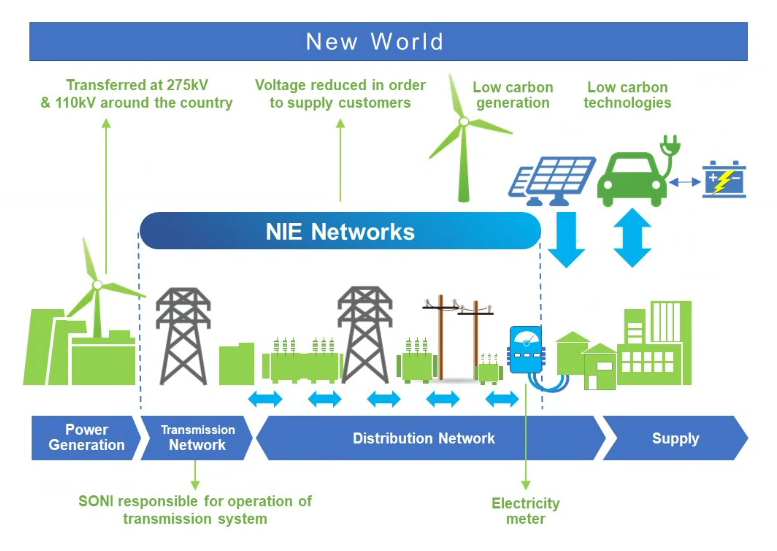Climate change legislation, such as the EU’s Renewable Energy Directive, the subsequent Clean Energy Package and the UK government's 'net-zero by 2050' legislation is driving the decarbonisation of the energy sector. This is forecast to create significant growth in technologies that will place increasing demands on the electricity network, in turn requiring major changes in how the electricity industry operates. Examples of such changes, many of which are already having an impact are:
- Renewable generation continues to grow.
- Electric vehicle and heat pump uptake is accelerating.
- More and more consumers now have the ability to produce their own electricity.
- New technology is giving consumers more control over how they use electricity.
- Energy storage technology is rapidly improving and its use growing accordingly.
Consumers are becoming prosumers and are playing a much more active role in network control and management. As a result, the demands on the electricity network are changing. The network, which was designed to efficiently facilitate the flow of electrical energy towards the customer, is now experiencing significant energy flows in the opposite direction. Distribution Network Operators (DNOs) have already begun to take a more active role in the operation of the system; however, it is recognised that more dynamic DNO management will unlock further customer benefits.
To effectively manage this changing landscape it is acknowledged that DNOs will need to evolve their roles and responsibilities, a change which is often referred to as the evolution from a DNO to a Distribution System Operator (DSO).
A DSO can be defined as:
“A Distribution System Operator (DSO) securely operates and develops an active distribution system comprising networks, demand, generation and other flexible distributed energy resources (DERs). As a neutral facilitator of an open and accessible market it will enable competitive access to markets and the optimal use of DERs on distribution networks to deliver security, sustainability and affordability in the support of whole system optimisation. A DSO enables customers to be both producers and consumers; enabling customer access, customer choice and great customer service.”

Our Approach
We are taking a customer centric approach to defining this evolution. Whilst we believe that it is important that we develop a Northern Ireland specific DSO vision, due to the specific nuances of the Northern Ireland network and market, we believe it is, as far as possible, necessary to ensure consistency with industry’s broader direction of travel. To this end we are heavily engaged in the ENA Open Networks Project, which brings together nine of UK and Ireland's electricity grid operators, respected academics, Non-Government Organisations (NGOs), Government departments and the energy regulator Ofgem. Read more about the Open Networks Project here.
Whilst collaborating with the ENA and other UK DNOs (through the Open Networks Project) to maintain a consistent approach to a DSO across the UK, we have ensured continuous engagement with our stakeholders to obtain a NI perspective on what fundamental changes are required to existing DNO functions to deliver benefits to our customers. In July 2018 we released a Call for Evidence (CfE) asking our customers for their views on our evolution to a DSO, with an associated industry workshop held in September 2018. Taking on board the views from the CfE, in February 2019 we released our consultation document, providing a response to the CfE and the opportunity for stakeholder feedback on our proposals. This customer and stakeholder engagement provided the foundations for a Recommendations Paper to the Utility Regulator in December 2019.
To open up the network and enable customer benefits, we identified seven key DSO functions that will require development to enable us to efficiently manage this changing landscape. These were highlighted throughout the consultation process, and included:
- Market Facilitator - Enabling Distributed Energy Resources (DERs) to participate in Transmission System Operator (TSO) markets whilst respecting the distribution network integrity.
- Service Provider - Utilisation of network assets in innovative ways to provide services to help the TSO balance the system.
- Congestion Management - Enabling smart and market-based solutions to be deployed as alternatives to conventional reinforcement.
- Connections - Providing customers with options in how they connect to the network and utilising innovation to connect customers to a heavily congested network.
- Data Provision - Provision of detailed data between the TSO and DSO to enable more efficient system development and operation, and the provision of open data for public use.
- Network Management - Development of new tools and operational procedures to improve operational processes and efficiencies.
- Pricing - Pricing reform to provide opportunities and appropriate incentives to both demand and generator network users, while ensuring fairness to all customer groups.
All consultation documentation can be found in our Document Library.
